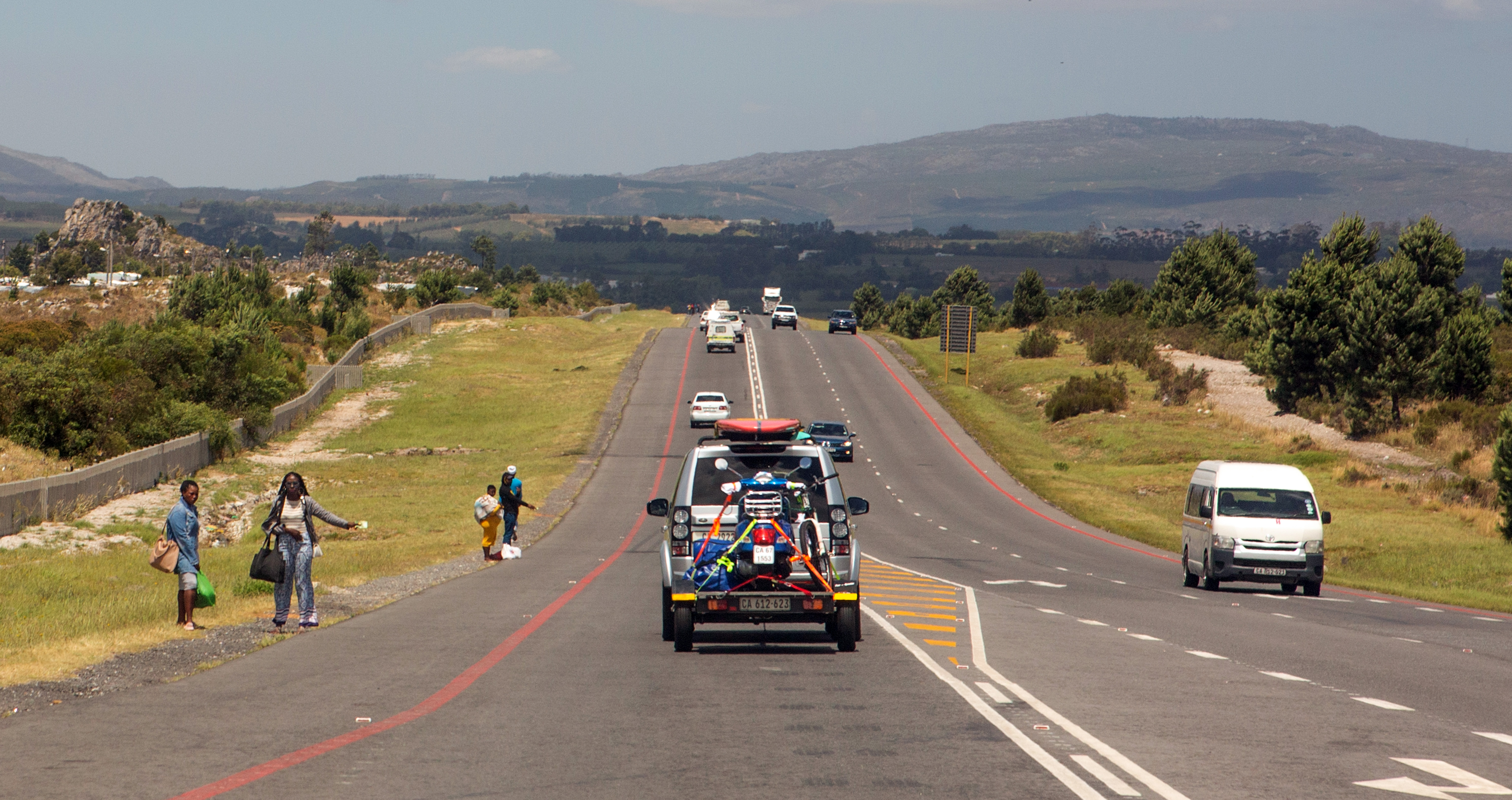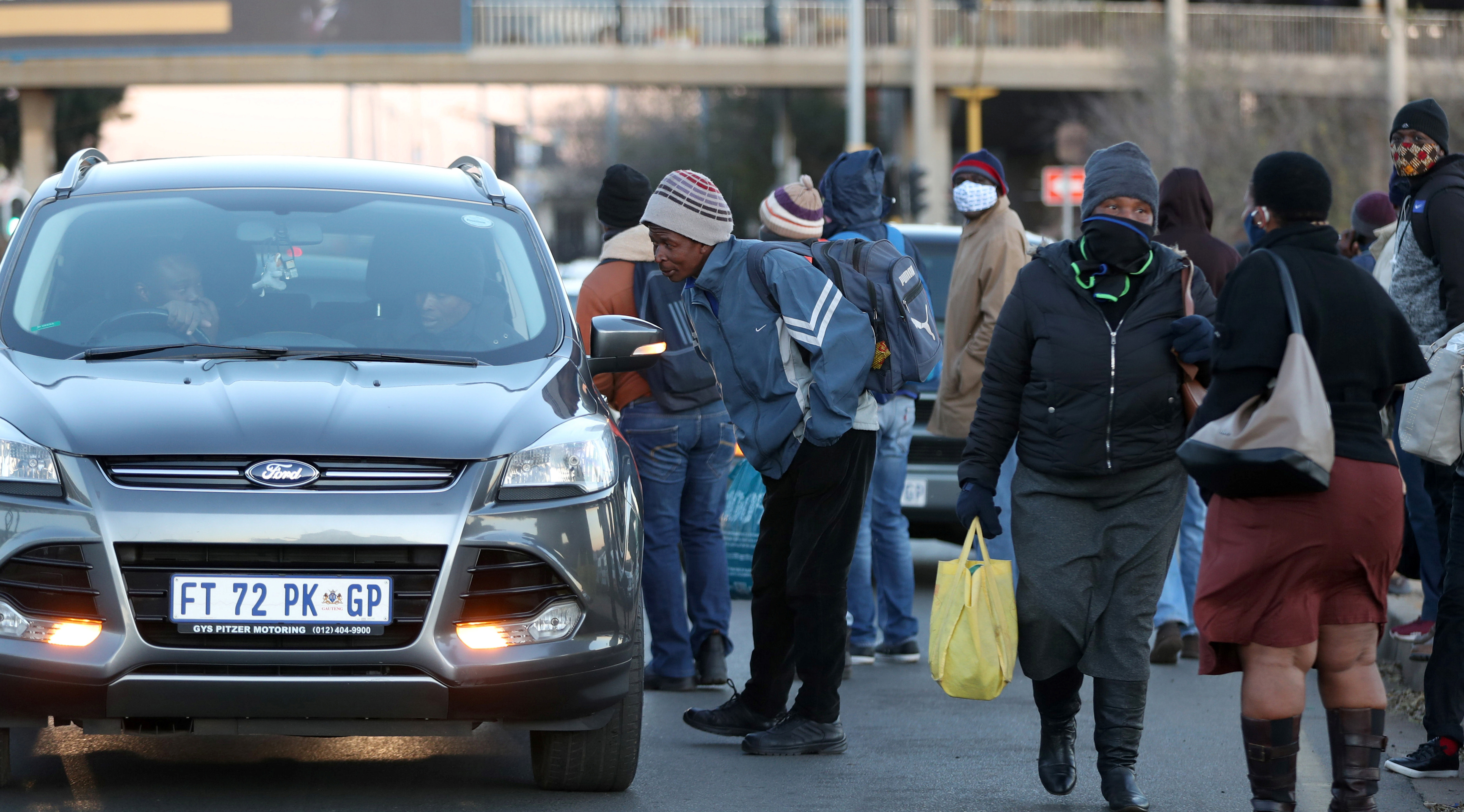South Africa is a paradoxical place. The country is riven with difference, along race, class, ethnic, religious and many other lines. Difference can be good, which is why the new institutional mantra preaches diversity. But it can also be an axis of inequality, convert into suspicion and lead to hostility.
This is one of the reasons that nation-building has been such a strong feature of South African history – in the early 20th century the call was to unite whites across ethnic lines (Afrikaner, English speakers) and in the run-up to the 1994 elections the call for nonracialism was important in seeking to give all South Africans a stake in the new, democratic South Africa.
Hitchhiking is one of those practices that can momentarily bind people across divides. Those with vehicles can help those without. The class element is important because this practice generally involves people with resources helping those with fewer resources. People seeking lifts tend not to have their own vehicles and depend on public transport or goodwill for mobility. Hitchhiking offers an opportunity to help people, to build a bit of goodwill.
Hitchhiking is not without some risk and inconvenience. Drivers can be hijacked when stopping to offer a lift. And when a hiker accepts a lift from a stranger they are open to abuse. Motorists have been known to prey on hikers. The best-known case is South African Bonnie and Clyde, Charmaine Phillips and Pieter Grundlingh, in 1983. By the time they were caught, they’d stolen from and murdered four men.
During the Aids pandemic, long-distance truck drivers who gave lifts to women were identified as a major vector in the spread of HIV, demanding sex in exchange for giving a lift.
In the past three decades the terrain of hitchhiking has changed dramatically. I can’t remember when I last saw a white hitchhiker. Now people waiting by the side of the road, hoping for a lift, are often hoping for short rides on routes where public transport offers no service. No trains, no buses.
In the rural areas there still exists a tradition of giving lifts – taking people 10km to 20km to their place of work, or their homes, to visit their friends or relatives or simply to do some shopping. This is not well documented but especially in rural locales it is a critical contribution to social cohesion.
Nation-building
After 1994, when the invitation to contribute to building a new South Africa was extended to the country’s inhabitants, giving a lift to somebody in need might have been considered a very small contribution to building a new nation, one with massive divisions of wealth inequality and poverty, but with ties that could bind, ties that would invite those with transport to help those without.
Today hitchhiking is not what it used to be. Poor, often desperate people now proffer green or brown notes to entice motorists to help them. The money is intended as a contribution to petrol costs. Hitchhiking has become an act of monetary exchange. Most motorists don’t stop, they drive on.
Why has this happened?
In the apartheid past, the government encouraged hitchhiking. There were signs and identified places for hitchhikers. This was largely driven by a militarised state seeking to help white conscripts travel to see their families, but it contributed to a culture of sharing. It was certainly not the case that hitchhiking was racially segregated – lifts were given across the colour line. There is no such encouragement by the state today.
 People hitchhike along the N2 on 20 December, 2019. (Photo: Gallo Images / Misha Jordaan)
People hitchhike along the N2 on 20 December, 2019. (Photo: Gallo Images / Misha Jordaan)
It is well known that public transport has collapsed, especially passenger rail. This has largely been a case of neglect although the collapse has been abetted by the state sitting on its hands while passenger trains have been attacked.
The rural bus services have also dramatically diminished, with those private operators seeking to continue to provide a service often under violent attack. The state has done virtually nothing to protect these buses.
This means that huge numbers of people who don’t own or have access to private vehicles are dependent on the goodwill of motorists and the taxi industry.
The taxi industry has grown massively in the past three decades as public transport has collapsed. It is not just an effect of government maladministration. Even before the end of apartheid, the long-distance taxi industry provided rare opportunities for black entrepreneurs. In a country with an established migrant labour system, long-distance taxis offered a desired service for workers and a source of profit for businessmen.
Meshack Khosa’s work (Read: Changing state policy and the black taxi industry in Soweto) has traced the roots and development of the taxi industry and identified how very large it rapidly became and how woven into the fabric of the economy it was. Since the end of apartheid the taxi business has been promoted as part of a plan to provide accumulation opportunities for black businessmen.
But the taxi business doesn’t rely on state support. It pursues its interests aggressively and often violently.
The taxi industry is huge now and a place of violent competition and chauvinism. Taxi operators and bosses from KwaZulu-Natal to Gauteng and Western Cape are routinely assassinated. The government seems reluctant to take decisive action, reasoning perhaps that taxis provide a critical service that the state no longer does or can provide. So, taxi drivers and operators are generally treated with kid gloves.
There are too many vested interests now – too many passengers, too many drivers, fare collectors, protectors. And passengers have little option.
Tim Gibbs (Becoming a “Big Man” in Neo-Liberal South Africa: Migrant Masculinities in the Minibus-Taxi Industry) has written about the rise of KZN taxi bosses and how it has come with a form of masculinity that embraces violence. This gender performance can be seen in instances of rape and of sexual harassment that are occasionally the focus of a media story – of women with short skirts hounded and humiliated.
Read more in Daily Maverick: Rape culture is a product of systemic and institutionalised patriarchy
It can be seen in the willingness to intimidate and to ignore traffic regulations. How many motorists can attest daily to taxi drivers ignoring red traffic lights, cutting off other motorists, stopping in no-stop zones, blocking traffic and generally acting as though the road belongs to them? It is true that not all taxi drivers are traffic bullies, but I am surprised when a taxi stops at an orange light, respects a four-way stop during a power outage, or allows another motorist to change lanes.
The slow death of hitchhiking
So, what has this to do with the slow death of hitchhiking?
Last week I was driving from the Western Cape town of Robertson towards Worcester. I know this section of road well. There are many people at specific places who wait for lifts. Hitchhikers. I have often given lifts, including, memorably, to a Zimbabwean laden with two large cases who intended to catch a bus from Worcester back to Zimbabwe. I admired his optimism.
Today, driving alone, I stopped where a man and a woman were waiting. I rolled down the window and asked the woman if she’d like a lift. She had R30 in notes in her hand. She said she was going to Belville. I said I didn’t want any money but probably couldn’t drop her where she wanted to go.
I looked up.
A taxi had crossed a solid white line and was now six inches from my bumper, facing me. A driver and the tout got out and, in the next five minutes, asked me, then told me, then threatened me, that I should offload this person (the male had not yet got into my car) because she was their property. They were claiming a monopoly on transport on that road. They were claiming it by force. I tried to reason with them and they became more insistent.
What happened to good citizenship? Do we even have any idea what this means any longer?
As this process unfolded, another taxi came up from the Robertson direction and parked six inches from my back bumper. I was parked in. At one point the younger man indicated a bulge in his jacket – a knife? A gun? – and told me that he was asking “nice” but if I didn’t agree he would ask “bad”.
Eventually I capitulated and asked my female passenger (who had been silent throughout) to get out.
Anger and disgust
I feel very angry about and disgusted by this episode. Angry at the end of a dream, a dream for a harmonious South Africa where people would help one another – heed the call of citizenship and of national belonging.
I am angry about the dismal failure of the government to provide public transport to the poor who cannot afford their own vehicles.
I am angry about the government that has done nothing, or very little, to stop the thuggery that is a characteristic of the taxi industry. And I am disgusted with the men, in my case the young man, who have absolutely no regard for passengers or any appreciation for the desire of citizens like myself to help others.
This is just the tip of a grim war to control the provision of transport services by a few people, to use violence and intimidation to deprive potential passengers of choice, ultimately to fleece them in the name of Black Economic Empowerment. Taxis identify motorists who give lifts as the enemy. This modus operandi is not limited to the taxi industry. The construction mafia are in the same game and in league with the taxi bosses.
It is a time for despair. What happened to good citizenship? Do we even have any idea what this means any longer? We are building a country where inequality is rising. One way to tackle this, without government help, is to reach out to fellow citizens, to be of good cheer, to help where we can. But when thugs stand between a citizen and a good deed, what hope is there? DM
Robert Morrell is a senior research scholar at the Centre for Higher Education Development, UCT. He writes in his private capacity.




 A view of people hitchhiking along the N2 on 20 December, 2019. Hitchhiking also known as thumbing or hitching. Hitchhiking is a means of transportation that is gained by asking individuals, usually strangers, for a ride in their automobile. Allegedly nowadays, hitchhiking is perceived as dangerous, and few drivers are willing to pick someone up. many people travel this way it's a great way of getting from A to B, it’s free, each trip is a memorable adventure and it's a great way to meet people (Photo by Gallo Images/Misha Jordaan)
A view of people hitchhiking along the N2 on 20 December, 2019. Hitchhiking also known as thumbing or hitching. Hitchhiking is a means of transportation that is gained by asking individuals, usually strangers, for a ride in their automobile. Allegedly nowadays, hitchhiking is perceived as dangerous, and few drivers are willing to pick someone up. many people travel this way it's a great way of getting from A to B, it’s free, each trip is a memorable adventure and it's a great way to meet people (Photo by Gallo Images/Misha Jordaan) 